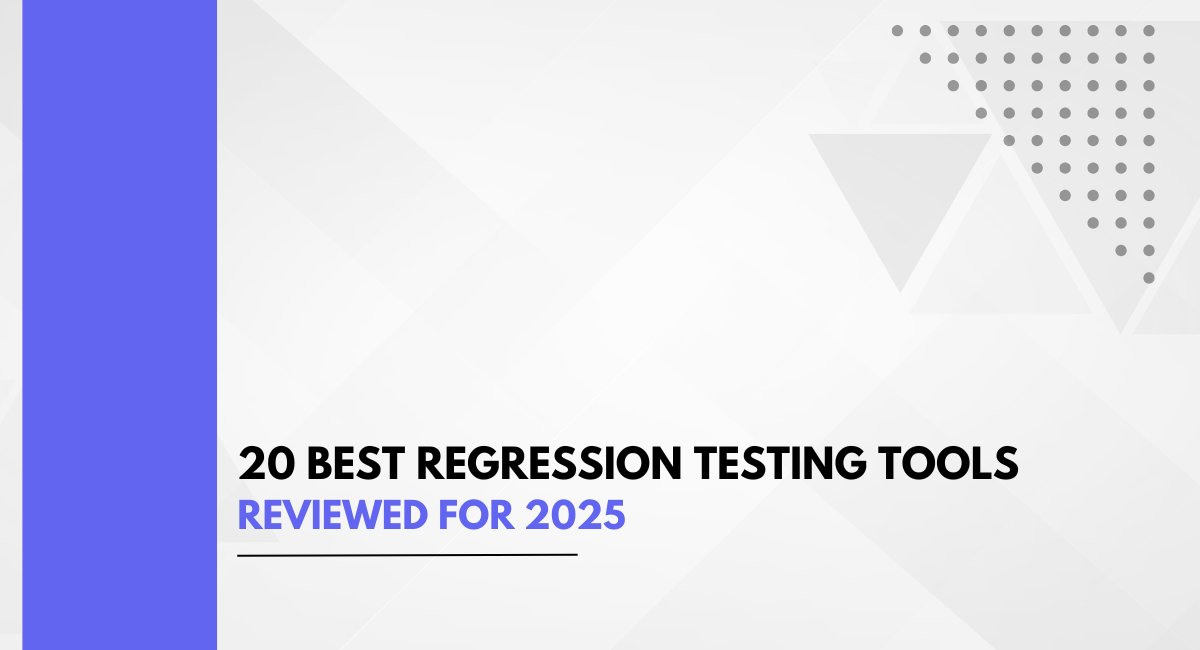Quick Listen:
Picture this: you roll out a polished app update, only to discover that a critical feature like the checkout button on an e-commerce platform has stopped working. This is the kind of disaster regression testing tools prevents. By systematically re-running tests on existing functionality, these tools ensure updates don't introduce costly errors.
In 2025, as businesses increasingly rely on digital platforms, the stakes are higher than ever. The global regression testing tool market, valued at USD 1.2 billion in 2023, is projected to reach USD 3.4 billion by 2032, growing at a compound annual growth rate (CAGR) of 12.1% Dataintelo. This growth is driven by the rising complexity of software and the ongoing push for digital transformation across industries.
The adoption of DevOps and Agile methodologies has intensified the demand for robust testing solutions. Frequent releases require tools that can keep pace, catching defects early to maintain seamless performance. Whether you're a lean startup or a global enterprise, choosing the right regression testing tool hinges on balancing speed, scalability, and cost. This guide examines the top 20 tools leading the charge, alongside emerging trends and actionable strategies to optimize your testing approach.
Emerging Trends Shaping Regression Testing
The regression testing landscape is evolving rapidly, driven by technological advancements and shifting industry needs. Here are the key trends transforming the space:
- AI and Machine Learning Integration: Artificial intelligence (AI) and machine learning (ML) are revolutionizing regression testing by automating test case generation, prioritizing critical tests, and predicting defects before they cause issues. The regression testing service market, valued at USD 2.5 billion in 2025, is expected to grow to USD 6.8 billion by 2033, achieving a CAGR of 15.37% Market Research Intellect.
- Cloud-Based Testing Platforms: Cloud-based tools enable distributed teams to test across diverse environments mobile, web, or desktop without infrastructure challenges, offering scalability and flexibility critical for modern development cycles.
- Low-Code and No-Code Solutions: Emerging platforms are democratizing testing, allowing non-technical team members to contribute without needing to handle complex code, expanding access to quality assurance across organizations.
- CI/CD Pipeline Integration: Tools that integrate seamlessly with CI/CD pipelines are essential for teams pursuing continuous delivery, ensuring testing aligns with rapid development cycles.
These trends highlight the need for tools that are not only powerful but also adaptable to diverse workflows and team structures.
The Top 20 Regression Testing Tools for 2025
With a crowded market of testing tools, selecting the right one requires evaluating ease of use, scalability, integration capabilities, cost, and advanced features like AI. Below is a curated list of the top 20 regression testing tools for 2025, categorized by their strengths:
- Open-Source Champions: Open-source tools provide flexibility and community support, making them ideal for teams with technical expertise and limited budgets. These tools support diverse browsers and platforms, catering to a wide range of testing needs.
- Enterprise-Grade Powerhouses: Enterprise-focused tools offer robust solutions for large-scale projects, providing low-code options and seamless integration with CI/CD pipelines, suitable for complex tech stacks.
- AI-Powered Innovators: AI-driven tools reduce test maintenance by adapting scripts to application changes and prioritizing tests based on risk, saving time and improving efficiency.
- Mobile Testing Specialists: Mobile-focused tools ensure applications perform seamlessly across iOS and Android devices, addressing the growing demand for mobile app reliability.
- Cloud-Based Leaders: Cloud-native platforms provide scalable testing environments, enabling distributed teams to validate software across diverse devices and browsers.
- Rising Stars: Emerging tools are gaining traction for their speed, reliability, and accessibility, including no-code platforms that empower non-technical users to participate in testing.
You may also be interested in: Top 30 Mobile Testing Interview Questions - A Best Guide
Book a Demo and experience ContextQA testing tool in action with a complimentary, no-obligation session tailored to your business needs.
